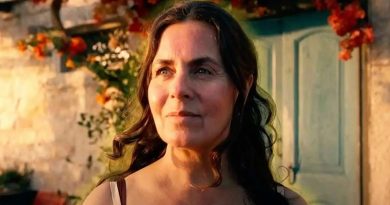Movie Review: Woodwind
Woodwind is a film by South African writer-director, Fin Manjoo, and stars Leandro Taub, Jasmin Jandreau and Andrea Christina Furrer. Manjoo wanted to make a great music film and Woodwind is the end product of a personal quest for the filmmaker to create something artful, beautiful, experiential, fresh, original, unconventional and inspiring. He’s achieved these goals with Woodwind, a stylish, enigmatic, beautifully composed and photographed music film, journey, soundscape, travelogue and spiritual quest for enlightenment… the sort of meditative experience that you need to let wash over you.
Much like a naturalistic version of The Great Beauty, we’re treated to luscious and vivid visuals as our fascinating and intrepid lead embarks on a solo journey of healing and self-discovery, exploring the spiritual through musical reductionism. Leandro Taub is Bonifaz, a South American composer who travels to India to search for the truth behind a poetic vision. Taub is determined, eccentric and a delight to watch as Bonifaz, journeying across the world through several varied and beautiful locations, resetting his mind around programmed thinking when it comes to music.
The magical mood, need for connectedness and fascination with nature and music resonates with the magic realism of August Rush. Woodwind is also reminiscent of the work of Jim Jarmusch and Pablo Cesar, boldly original, provocatively stylish and minimalist in approach using words to express poetry and outlooks. The soundtrack is rich, the visuals are symbolic and the nature is glorious, making this an intensely relaxing albeit compelling viewing experience. It’s hypnotic, filling the screen with a rich blend of sights and sounds that make it immersive and at times breathtaking. Classical Western and Indian music weave into refreshing natural sounds as beautiful shots of lush Indian forests are contrasted with the urban sprawl of the colourful city of Varanasi.

“The mind… where art and nature resound.”
It’s an extraordinary feat for a film made on a modest budget, one that doesn’t spoon-feed the audience, but invites one to stretch the spiritual bounds of understanding. The thought-provoking content and soundtrack will appeal to music aficionados, but also holds value for anyone who can simply appreciate art and nature. Having seen the 136 minute version of Woodwind, one can appreciate the tighter edit on the 106 minute final cut, which has a better pace and remains enigmatic in spite of its slightly faster clip.
Woodwind tends towards being divisive and disruptive, using an unconventional narrative structure, subtle story elements and some deliberately slow interludes. The film attempts to do this too, through sparse scripting, original thinking and a surreal mix of documentary realism and pristine cinematography. The eclectic sounds, moody atmosphere, blend of languages and exotic visuals almost override the need for traditional storytelling.
While the seamless dream and waking state make it a bit confusing at times and less accessible for the average viewer, Woodwind is more geared towards art house and experiential cinema than entertainment in the traditional sense. Much like any piece of art or poetry, Woodwind is not a film that insists you understand everything – enjoying its immersive qualities and finding its significance through your own interpretation is key.
The bottom line: Hypnotic





